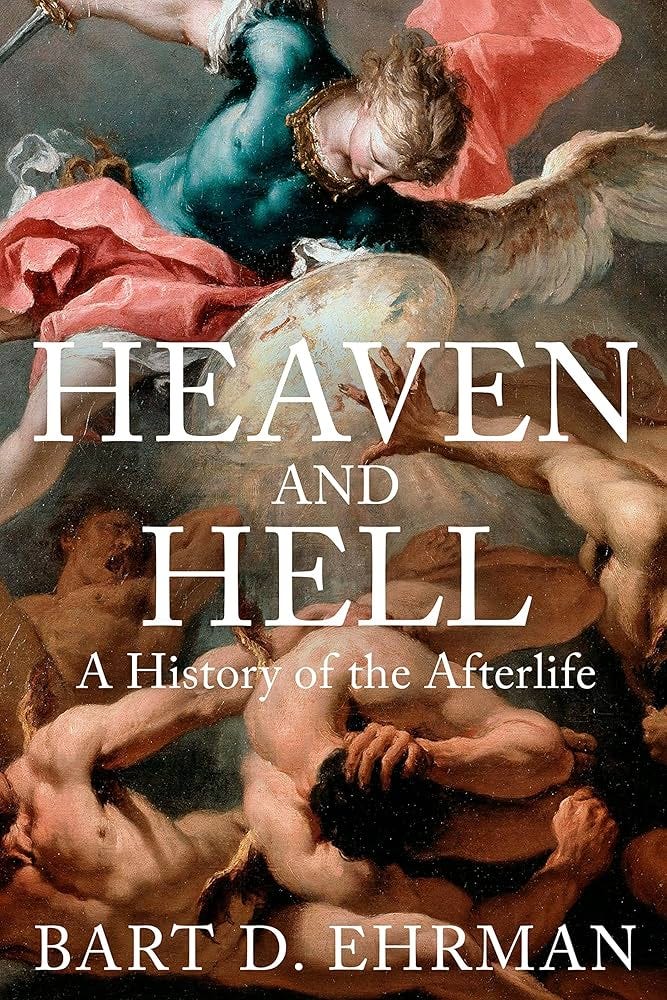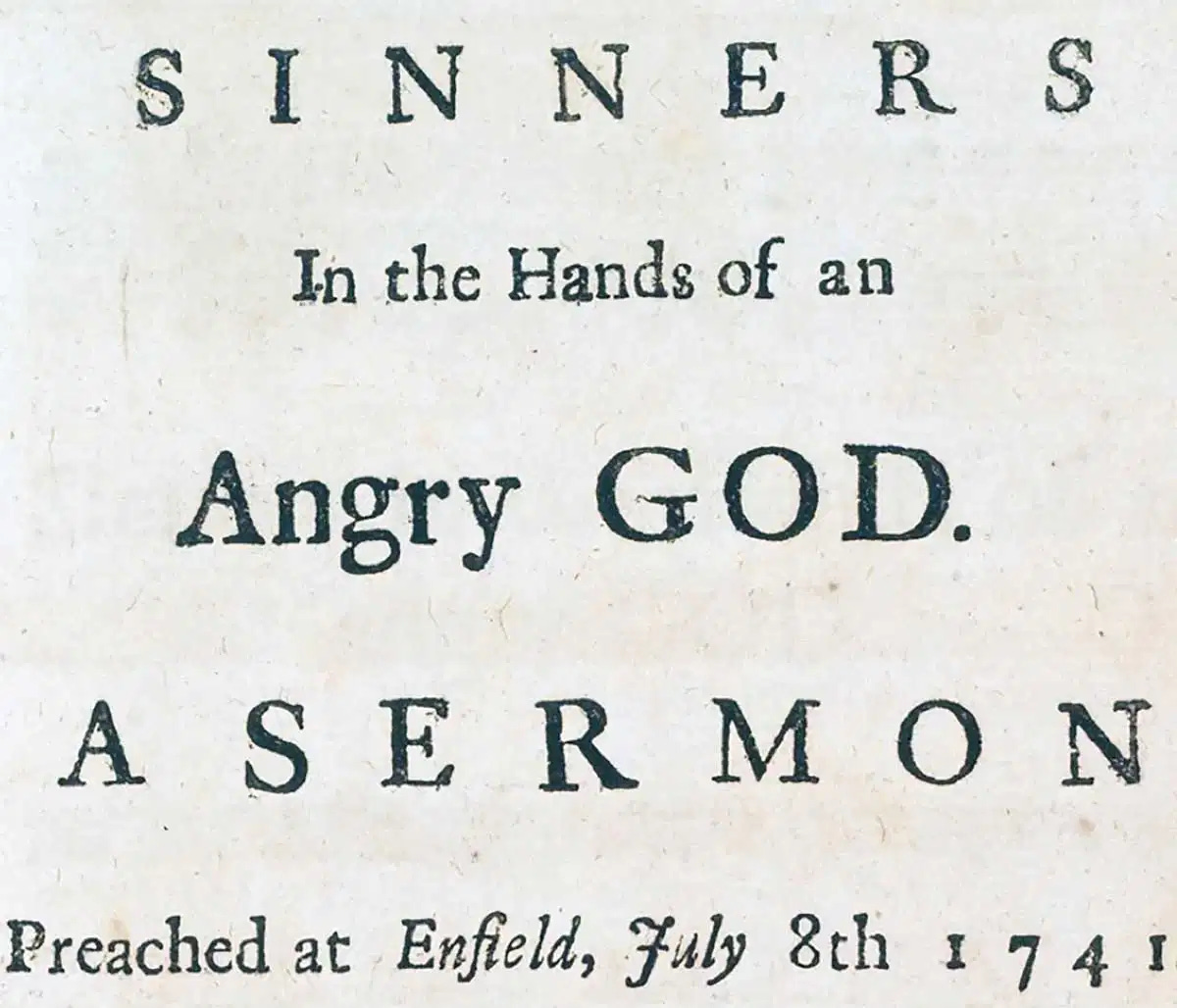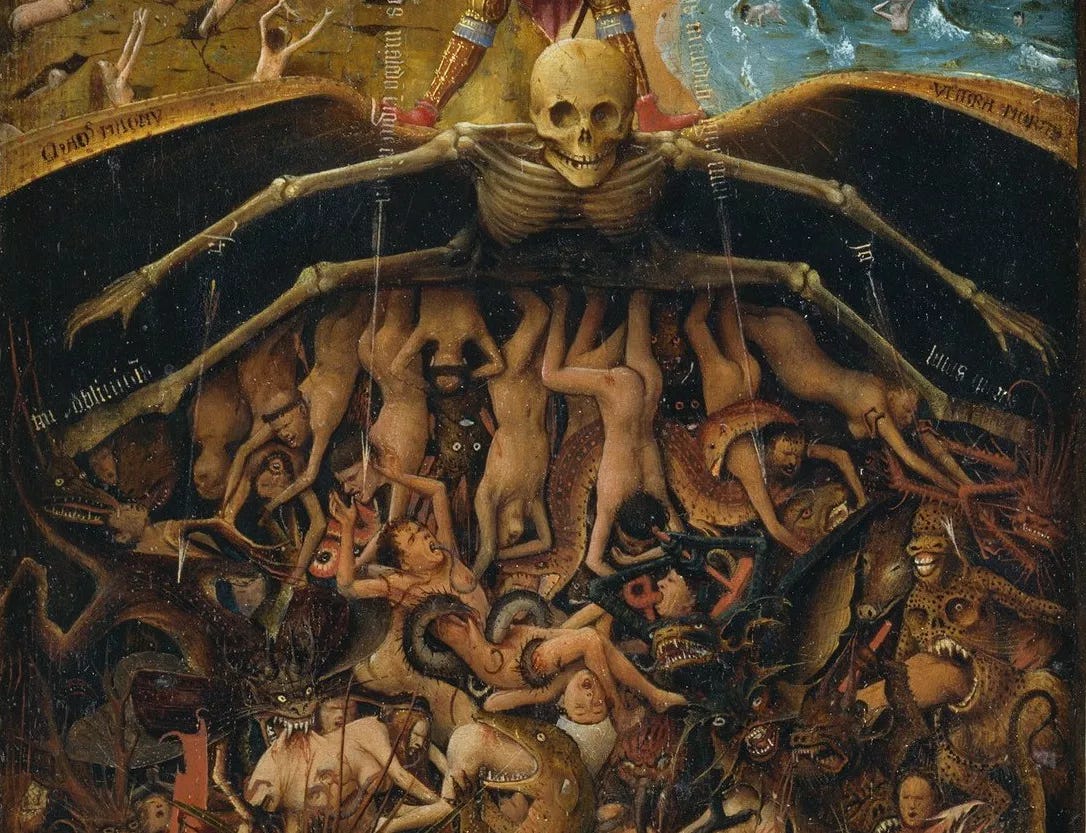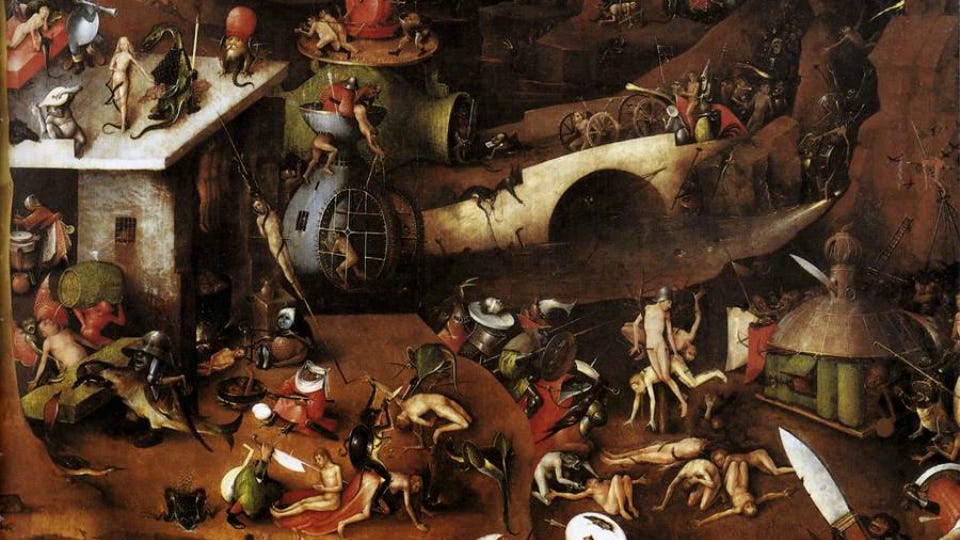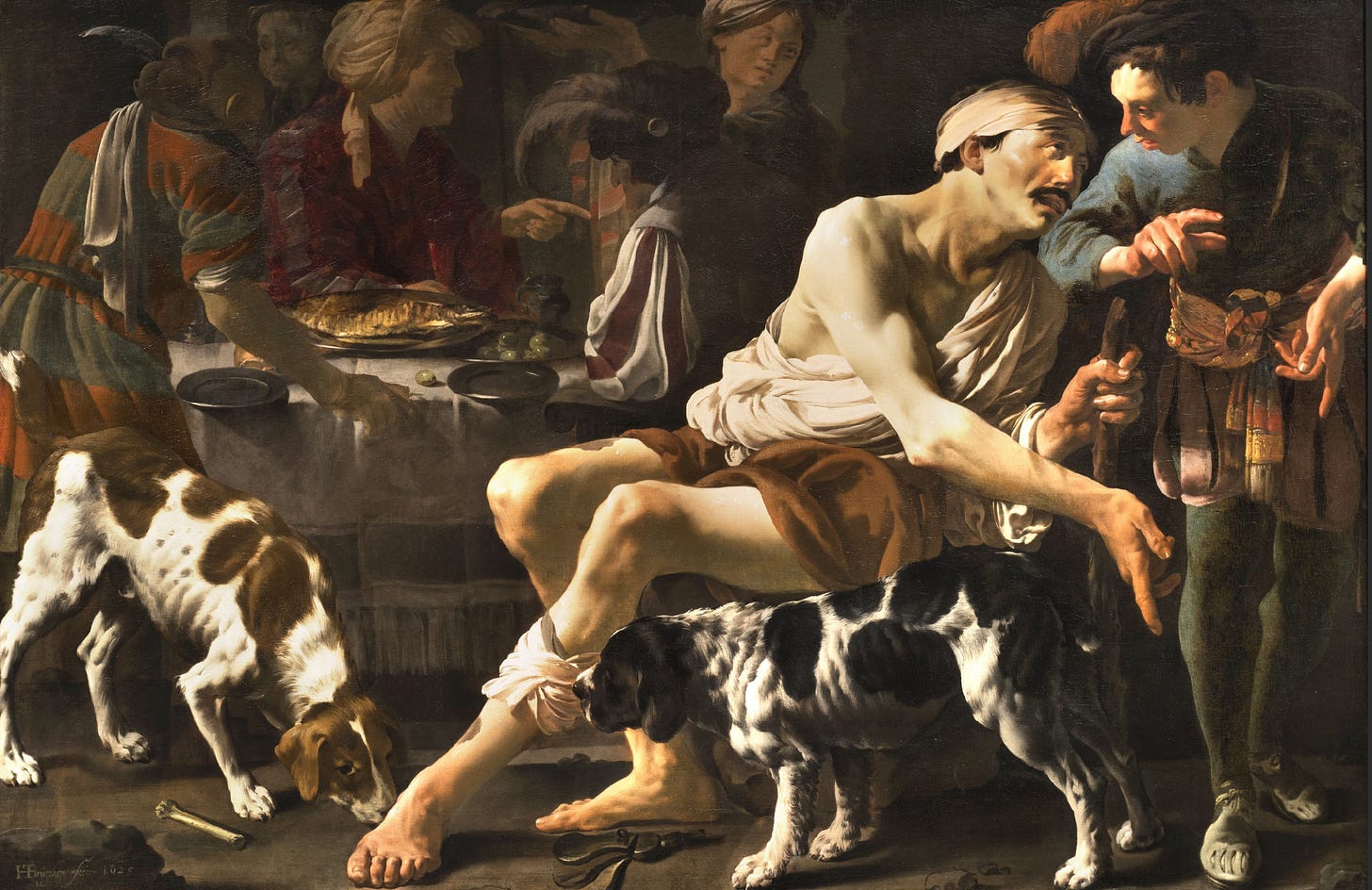Substack Post is a little late this week as I was finishing up For God so Loved the Empire manuscript and sending to readers this week. Stay tuned…
If heaven was the carrot, hell has always been the stick. Across centuries, preachers, poets, and pop culture have sketched it in lurid detail—Dante’s inferno with its nine circles, Jonathan Edwards’ trembling sermon about sinners dangling over the pit of fire, or even The Simpsons, where Ned Flanders shows up as the devil, smiling as Homer signs away his soul for a donut. The images are absurd, but they stick. Even when belief in them fades, fear lingers. Hell remains lodged in the cultural imagination like a splinter in the mind’s eye.
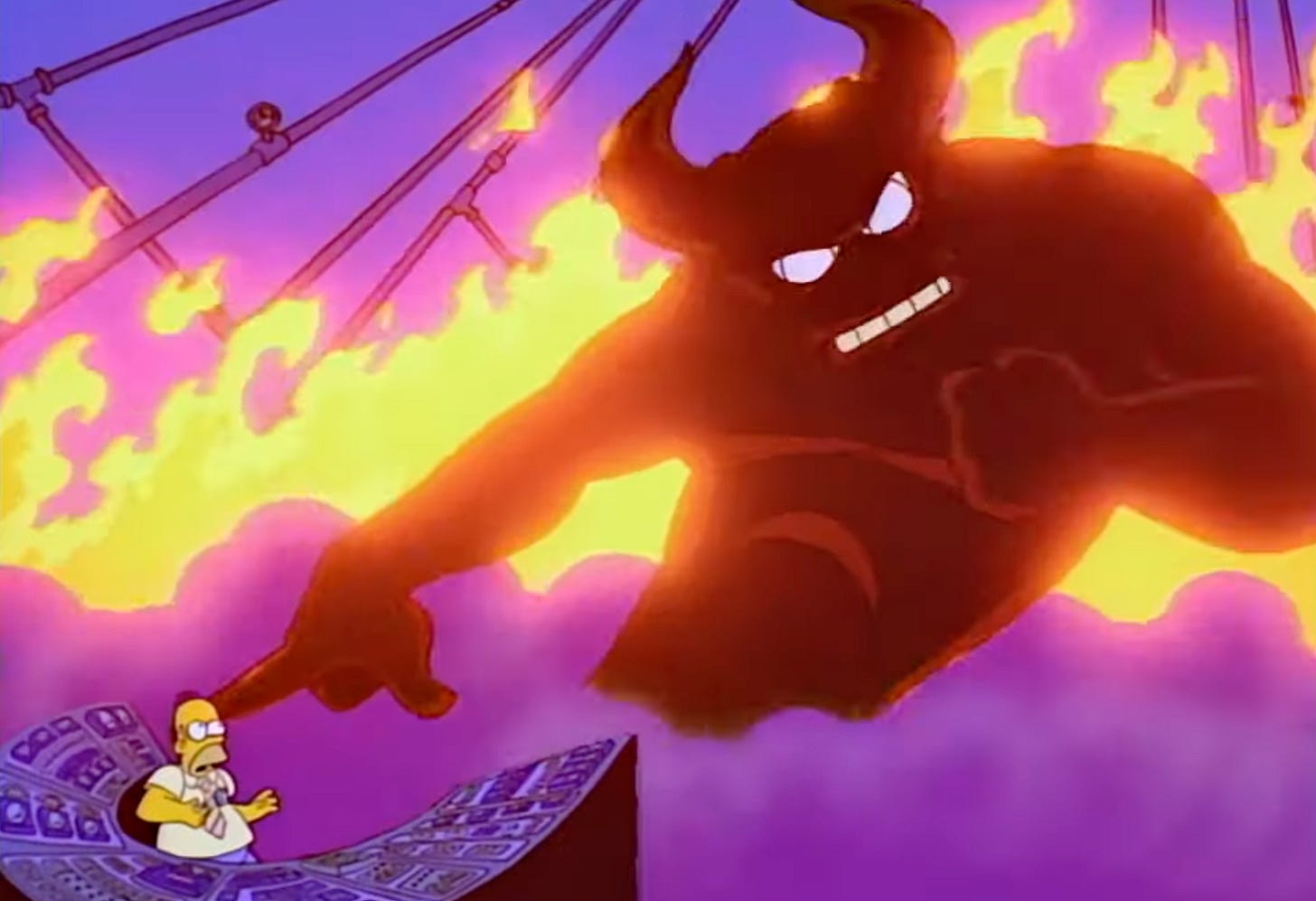
So following on from my similar ESSAY ON HEAVEN I wanted to focus a little attention on Hell. And let me be clear: I’m not writing this because I claim to know what happens after death. Far from it. And chasing post-mortem metaphysical certainty is a fool’s errand. There is this brilliant satire of the afterlife speculation in The Good Place—a Netflix comedy about humans navigating a bureaucratic afterlife. In the mid-level executive office there is portrait on the wall that turns out to be a shrine to the one human who got the afterlife description mostly right. When asked about it the executive explains,
“Hindus got a little bit right. Muslims, Jews, Christians, Buddhists each guessed maybe five percent. But Doug Forcett—a stoner kid from Calgary in the 1970s—once got really high on mushrooms, and when his buddy Randy asked him what happens after we die, Doug launched into a long monologue that turned out to be ninety-two percent correct. We couldn’t believe what we were hearing. He’s pretty famous around here.”
It’s hilarious precisely because it punctures our pretensions. Every religion has speculated, but in the end, the closest anyone came was a stoner’s campfire guess on mushrooms. The point isn’t that Doug was right, but that the whole enterprise of trying to “solve” the afterlife is comic at best, corrosive at worst. Which is why I’m not interested in mapping eternity. I’m interested in what ideas like hell do to us here and now—how they shape our fears, our ethics, and our imagination of God.
I honestly consider any speculation about the afterlife to be a “beyond my pay scale” enterprise. Which may sound funny coming from a priest, since many people assume my whole job is to help folks end up in the good place and avoid the bad one. But that’s never been how I understand my calling. I’m far more concerned with how faith shapes our life in the here and now.
The Problem with Hell as an Idea
The notion that good people must be rewarded and bad people punished is about as universal as it gets. Even Donald Trump, hardly a model of moral theology, said just this week: “I wanna try and get to heaven if possible. I’m hearing I’m not doing well. I am really at the bottom of the totem pole.” He even articulated how he imagines it might work in cosmic terms: “There has to be some kind of a report card up there someplace, you know, like, let’s go to heaven, let’s get into heaven, and it’s sort of a beautiful thing.”
It’s a revealing moment. For Trump—as for so many—faith boils down to an eternal grading system, a cosmic report card where good behavior is rewarded with heaven and bad behavior punished with hell. It sounds tidy, but the cost is high: God becomes less a source of life and love, and more a celestial accountant, tallying sins and virtues like debits and credits.
Hell becomes not just a doctrine of judgment; in this accounting it also becomes a rhetorical weapon. It’s where you send people you don’t understand, or don’t like. After my Palm Sunday op-ed ran in The New York Times, Glenn Beck went on air to tell me, "Hell's a-waiting!" He wasn’t making a serious theological claim. He was condemning me, reaching for the oldest stick in the Christian arsenal. In his mouth, hell wasn’t about the afterlife at all. It was a cudgel, a weapon. To disagree with his worldview was to risk eternal fire. That’s not theology; that’s intimidation.
That’s the problem with hell as an idea. On its face, it promises moral order: good rewarded, evil punished. But in practice, it so often devolves into fear, control, and condemnation. The theology is thin; the psychology is thick. It shapes us less into people of love than people of suspicion.
Part of the problem is that the hell most people picture—the fiery pit of eternal conscious torment—isn’t really in the Bible. The Hebrew Scriptures speak of Sheol, a shadowy underworld where all the dead go, good or bad. It’s not punishment; it’s a grave. The New Testament language is more diverse—Gehenna, a smoldering trash heap outside Jerusalem that Jesus invoked as a metaphor; Hades, the Greek underworld; even “outer darkness,” with imagery that shifts depending on the parable. None of these coalesce into the medieval cartoon of red devils and eternal roasting.
The hell we inherited is a post-scriptural construction. Church Fathers, eager to systematize doctrine, began fusing these metaphors into a moral engine. Medieval imagination added fire and demons; Dante built the nine circles; revivalist preaching added the sulfur and urgency. As Bart Ehrman shows in his book Heaven and Hell, much of what we think of as Christian teaching on the afterlife is late invention, not early consensus.
Even my own Episcopal tradition—and myself, growing up as a PK (priest’s kid)—couldn’t escape this cultural idea. It was rarely preached outright, but it hung in the air, baked into Sunday school lessons, cartoons, and the broader imagination. Hell was always there, just below the surface, shaping how we thought about God.
This is where my own theology diverges from the script. I’ve sometimes been accused of universalism, and maybe that’s fair. Because if I accepted the fall-redemption narrative in its strictest form (which I don’t), then the thought that Adam’s sin condemned all of humanity while Christ’s salvation saves only a few makes no sense. It would mean Adam’s act was more efficacious than Jesus’s—which I find preposterous. To me, that logic exposes the cracks in the whole hell-building project. The doctrine doesn’t arise from scripture’s own witness so much as from the church’s anxious need to enforce order, weaponize fear and then offer the only solution in the form of a get out of jail free card.
Hell’s Psychological Toll
If heaven was meant to inspire longing, hell was meant to instill fear. And fear is a powerful teacher—though rarely a good one. For centuries, churches used hell as the ultimate disciplinary tool. Sometimes it was explicit, thundered from pulpits; other times it was just implied, the shadow side of every Sunday school chart or catechism quiz. Either way, the effect was the same: obedience through terror.
In the medieval Catholic Church, this logic fused especially with the practice of confession and indulgences. Parishioners were reminded that unconfessed sin meant damnation—eternal fire waiting just beyond the grave. The threat of hell hung heavy over the confessional booth, compelling the penitent not only to name their sins but often to purchase indulgences, material offerings to the church that promised relief from divine punishment. Fear of hell thus fueled both submission and revenue. The spiritual became transactional: a coin dropped into the chest, a soul sprung from the flames. In this way, hell served less as a vision of the afterlife than as a mechanism of earthly control.
The irony is obvious. A doctrine meant to lead people to God drives many away instead. Fear-based obedience is not love; it is a form of coercion. And when faith is reduced to fear—when God becomes the warden of a cosmic prison—the soul shrinks. The doctrine of hell, rather than cultivating virtue, too often breeds anxiety, shame, and suspicion.
Therapists today even have a term for this: religious trauma syndrome. Studies show that fear of eternal punishment can heighten anxiety, trigger obsessive-compulsive scrupulosity, and leave people scarred long after they leave the church behind
Hell as a Political and Social Weapon
If fear is effective at shaping individuals, it is even more effective at shaping societies. Hell has never just been a doctrine about the afterlife; it has been a tool of control in this one. Preachers invoked it to enforce conformity, kings and bishops used it to silence dissent, and revivalists wielded it to rally the masses.
Think of Jonathan Edwards’ famous sermon, “Sinners in the Hands of an Angry God,” where he describes God dangling human beings over the pit of hell like a spider over a fire. That sermon wasn’t simply a theological reflection—it was a tactic, meant to provoke terror and submission. Across the centuries, hell became shorthand for obedience: obey the church, obey the crown, obey the rules—or else.
It is no accident that this logic mirrors our own system of punishment—drawn directly from this theological foundation. Prisons, executions, and public torture all worked the same way: instill fear to maintain control. Hell was the metaphysical extension of the dungeon and the gallows. (READ ESSAY ON THEOLOGICAL FOUNDATION OF CRIMINAL JUSTICE) If you crossed the wrong authority here, you faced punishment there. This is the tragedy of hell’s long afterlife: not only that it warps our view of God, but that it grants human authorities a divine endorsement for their own systems of control.
Theology Gone Wrong
The deepest problem with hell is theological. A God who creates billions of people only to consign some/most of them to eternal torment is not just fearsome—such a God is morally monstrous. If finite creatures can commit finite sins, how could the just response be infinite punishment? The math doesn’t add up.
And more than the math, the character of God is at stake. If God is love, as Scripture insists, then eternal conscious torment is incoherent. Love does not torture forever. Justice does not delight in suffering. Yet that is exactly the image of God that a hell-centered theology leaves us with: a deity indistinguishable from the cruelest tyrant, one who rules not by mercy but by fear.
Theologians have tried to make this picture palatable by appealing to God’s holiness, God’s wrath, or human free will. But none of it resolves the central contradiction: that the supposed good news rests on a foundation of eternal bad news for most of humanity. And if, as I argued earlier, Adam’s fall was more “effective” than Christ’s salvation—if hell swallows more than heaven saves—then we’ve placed greater faith in the power of sin than in the power of grace. That is not gospel.
Hell, in this form, doesn’t just warp our psychology or our politics. It warps God. It gives us a deity made in the image of empire—punitive, merciless, enthroned on fear. And that, I believe, is theology gone wrong.
What’s Lost When We Preach Hell
When hell is at the center of the story, faith itself gets distorted. Religion becomes less about love, justice, and transformation, and more about survival and reward. The horizon of faith narrows: How do I make sure I don’t end up there? How do I secure my spot elsewhere? That isn’t discipleship—it’s spiritual risk management.
The cost is enormous. Hell reduces the gospel to a fear-based transaction. This resembles what psychologists and pediatricians say about physical punishment in childhood. Hitting a child might change their behavior—but at a heavy cost. Research done at my alma matter, The University of Texas, drawing on studies spanning fifty years and over 160,000 children, found that the more children were spanked, the more likely they were to develop aggression, antisocial behavior, mental health problems, and cognitive difficulties—effects that are indistinguishable from those of physical abuse.
If I thought this was the model for the spiritual life I would not have dedicated my life to sharing it. Because if I had to distill Jesus’ ministry into a couple of one-liners, it would not be threats of torment. It would be: “Do not be afraid.” And: “Love one another as I have loved you.” That is the center. Fear is not. Hell is not.
A Word About Lazarus at the Gate
Whenever hell comes up in church conversations, someone usually mentions the parable of the rich man and Lazarus. In Luke’s telling, the rich man feasts while Lazarus, a beggar covered in sores, lies starving outside his gate. After death, the roles reverse: Lazarus is comforted in Abraham’s bosom while the rich man finds himself in agony, begging for relief.
On the surface, it looks like Jesus is describing the afterlife in vivid detail. But as Bart Ehrman points out, the story is not a doctrinal blueprint—it’s a moral parable. Variations of the tale already circulated in Jewish and even Egyptian folklore. The point was always the same: the powerful and wealthy who ignore the suffering of the poor will see their fortunes overturned. Jesus taps into that tradition, not to map heaven and hell, but to expose the urgency of justice.
Read this way, Lazarus at the gate is not about eternal torture at all. It is about the blindness of privilege in the here and now. The rich man had a chance to love his neighbor while he was alive, and he chose not to. The consequence was not some metaphysical torment, but the revelation of the truth: that the chasm he ignored at his doorstep became the chasm he could not cross.
And if Donald Trump were serious about his recent comments that heaven is like a divine report card, he might start here. Jesus’ story makes it plain that the “grade” is not about securing a spot in the clouds, but about how we treat the Lazarus at our gate. No figure in public life embodies the blindness of privilege more than Trump—the man of walls, of gilded palaces, of calculated indifference to the poor and the alien. To talk about heaven while ignoring the beggar at the gate is to miss the kingdom of God entirely.
That’s the thrust of the story. Not a cartography of the afterlife, but a summons to compassion in this life. Jesus’ warning is as sharp as it is simple: ignore the Lazarus at your gate today, and you’ll miss the kingdom of God altogether.
So if hell exists anywhere, it is in the systems we build that crush the poor, poison the earth, and feed off fear. And if the kingdom of God exists anywhere, it is wherever love casts out that fear. That is the story I encourage you to embrace—not a nightmare of eternal fire, but good news for the here and now.
Do not be afraid. Love one another. Attend to the poor at your gate.




